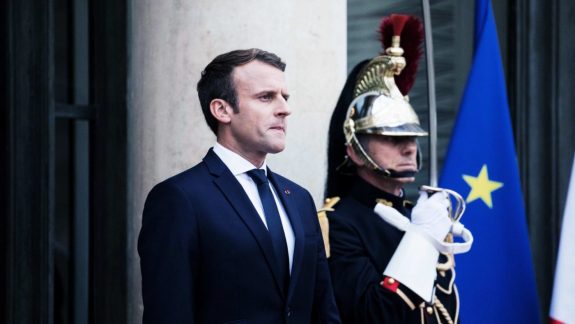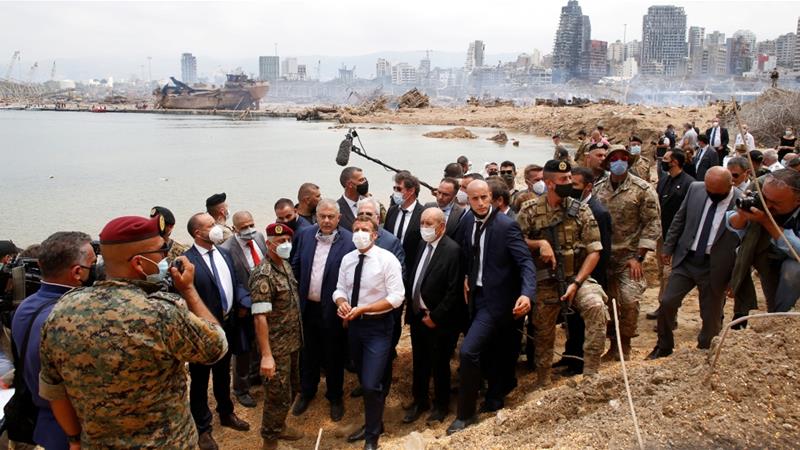Macron Lectures Lebanon: The Condescending Politics of Aid

The explosion in a Beirut portside warehouse containing over 2,750 tonnes of ammonium nitrate on August 4 has done its bit to light more fires under Lebanon’s ruling powers. With the blast still bloodily fresh and traumatic – the destruction of the city’s port with over two hundred deaths and thousands injured – promises of assistance and messages of solidarity were conveyed. A donor summit of fifteen government leaders was cobbled together in haste with French President Emmanuel Macron leading the show. “Assistance should be timely, sufficient and consistent with the needs of the Lebanese people,” went he words of the communique. But it was to be “directly delivered to the Lebanese population, with utmost efficiency and transparency.”
Aid is very much a tool of politics. Used to affect change, it often ends up having its own distressing consequences, entrenching a set of other power interests more amenable to the donor and enervating to the recipient. Governing classes in the recipient state are not so much replaced as redeployed; the canny and guileful adapt, donning new clothes for the institution approved by those providing aid.
When models of aid are celebrated, the common example is that of the Marshall Plan, advertised by its proponents, US Secretary of State George Marshall, and Secretary of Commerce Averell Harriman, as both noble yet self-interested. By providing aid to a devastated Europe in the aftermath of the Second World War, the US taxpayer would be inoculating the patient against the Communist virus while making the world safe for capitalism. Marshall put forth the case in an address to Harvard University during the course of receiving an honorary degree, a speech that has come to be associated with the aid and reconstruction plan that bears his name. “Aside from the demoralizing effect on the world at large and the possibilities of disturbances arising as a result of the desperation of the people concerned, the consequences to the economy of the United States should be apparent to all.”
In its post-colonial context, the donor-aid paradigm has its specific, troubling features. Former colonies, for instance, tend to receive more from the former colonial power than those lacking those ties. Sentiment is less important than attractive conveniences. Favours can be attained; deals made. Studies such as those done by Daina Chiba and Tobias Heinrich come to the unremarkable conclusion that “the colony effect on foreign aid stems from the greater saliency that donors give to policy concessions from former colonies.”
In the case of Lebanon, aid from a power like France comes with historical strings, marked by coatings of nostalgia and condescension. Memories of the French mandate from the 1920s are so strong in some circles that a petition is throbbing with signatures for a return to some form of control from Paris. It stresses, first and foremost, the incompetence of local leadership. “Lebanon’s officials have clearly shown a total inability to secure and manage the country. With a failing system, corruption, terrorism and militia the country just reached it’s [sic] last breath.” Then comes the vision: “We believe Lebanon should go back under the French mandate in order to establish clean and durable governance.” To date, the measure has received 61,433 signatures.
The petitioner’s creator Cyrille claimed to be “under no illusion” of achieving success in pursuing the matter. He admitted that France had its own lot of problems; he merely wished to “show the extent of the [Lebanese people’s] despair.” Not even a revolution would dislodge the “hegemony of the political class that has been there for 40 years.”
The donors have accompanied willingness to supply assistance with conditions to implement. The International Monetary Fund, true to form, promises outlays, provided that institutional reforms are made. These included the traditional demands: solvency in public finances; proved soundness of the financial system; restrictions on capital outflows. The IMF, in a sense, has been handed a boon by the blast: prior to the calamity, debt default talks with Beirut had stalled.
Macron, as the leader of the donor pack, was even more forthright. “The Lebanese authorities,” he told summit attendees on August 9, “must now implement the political and economic reforms demanded by the Lebanese people.” His laundry list of intrusive measures was extensive: reforms of the energy sector, public procurement and those designed to battle corruption. “An audit of the central bank and the financial sector should be conducted.”
When a foreign head of state proclaims the sovereign merits of another people, care should be taken. A catch is around the corner. “The Lebanese are a free, proud and sovereign people,” Macron went on to explain. “It is up to the country’s authorities to act so that the country does not go under and to meet the aspirations legitimately expressed by the Lebanese people in the streets of Beirut at this very moment.”
On the French president’s visit to Beirut on August 6, the spirit of the colonial administrator was on full, puffy display. To those protesting for the release of Lebanese militant George Ibrahim Abdallah, in French prison since 1984, he offered a vague “political pact”. Macron promised support to local NGOs and 15 million Euros for French-language schools. But in doing so, he was very clear to stress the loss of confidence between the governed and the governing power. Lebanon needed “fundamental change”, to be achieved within an international framework.

Image from aljazeera.com (Photo by Thibault Camus/Reuters)
As if realising his lecturing mode, he issued a qualification. “It is not up to me or to France to tell Lebanese leaders what they have to do and how they should do it.” But in matters of aid, it most certainly seems to be. He awaits “clear answers” before returning on September 1. One of those answers has certainly been offered: the wholesale resignation of the Diab government.
Like what we do at The AIMN?
You’ll like it even more knowing that your donation will help us to keep up the good fight.
Chuck in a few bucks and see just how far it goes!










1 comment
Login here Register here-
wam
Return to home pageThe poor old frogs are still coming to terms with DIEN BIEN PHU and the slaughter trying to keep north africa. Their arrogance will not abate till they reconcile those defeats.
That is over 60 years of head up their arse. From your words I have no doubt the lebanese would love to remove the head and replace it with their symbol.
ps
the septics would benefit from acknowledgement of their atrocities and losses.